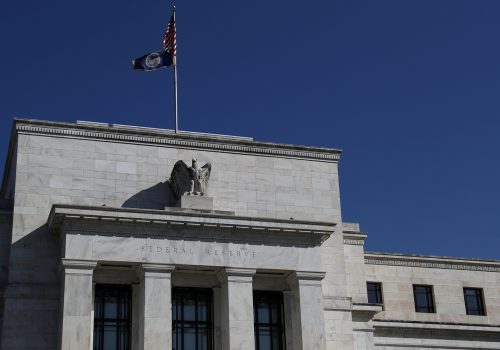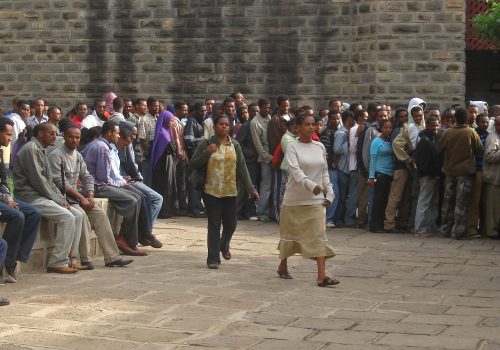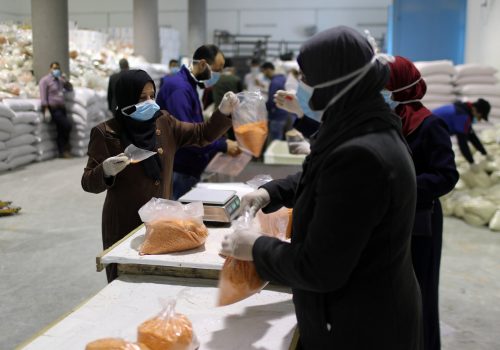CORONAVIRUS ALERT 4/3/2020
The Atlantic Council’s Coronavirus Alert is a regular summary of policy, economic, and business events around the emergency. To stay updated, sign up to the Coronavirus Alert here.
Summary:
The number of confirmed coronavirus cases exceeded a million worldwide, up from 80,000 after the first month of the crisis. The United States, where pressures on medical supplies continue and the vast majority of the population is under lockdown, recorded 1,000 deaths in one day from the virus for the first time. The pace of deaths in Italy and Spain seemed to slow.
Statistics:
There are now more than 1 million cases worldwide in about 180 countries and territories; in excess of 54,000 people have died.
QUOTE: “It will take more testing and tracing to know for sure, but the more information we have the more we can close the gap on dramatically different estimates [about coronavirus deaths] and learn what works and what doesn’t,” the editorial board of The Wall Street Journal wrote.
HEALTH AND SCIENCE:
- One month into the coronavirus crisis and there were fewer than 80,000 cases, Bloomberg shows in a graphic. More than one million infections have been confirmed in just eighteen weeks after it first surfaced in the Chinese city of Wuhan, the newswire reported. Fewer than twenty countries in the world seem to be free of coronavirus infections, Bloomberg said.
- The United States now has nearly a quarter of worldwide cases of coronavirus, with more than 241,000 infections as of late on April 2, The Washington Post reported. The death toll rose by 1,000 in a single day, the first time that’s happened in “the still-exploding coronavirus pandemic” in the United States, as Reuters puts it. About 90 percent of the US population is under stay-at-home orders, the Associated Press reported.
- Cases of coronavirus could be as high as 10 million worldwide because of a lack of testing for the respiratory disease in some countries, Australia’s chief medical officer said, Reuters reported. “[T]he true numbers are believed to be much higher because of testing shortages, many mild cases that have gone unreported, and suspicions that some countries are covering up the extent of their outbreaks,” the Associated Press said.
- The administration of President Donald J. Trump is expected to recommend that Americans in coronavirus hotspots wear face masks or coverings to limit the spread of the virus by those who have no symptoms, The Wall Street Journal reported, citing a draft document by the Centers for Disease Control and Prevention (CDC).
- Dr. Deborah Birx, the White House’s coronavirus response coordinator, warned against Americans getting a false sense of security by wearing masks, The New York Times said.
- Shortage of medical supplies continue to dominate news coverage of the pandemic. President Trump invoked the Defense Production Act to boost production of medical-grade face masks by Minnesota-based 3M to help first responders, the Associated Press reported. That follows “desperate pleas” from governors and healthcare officials, The New York Times said.
- In Europe, nine leading teaching hospitals said they will run out of essential medicines for coronavirus patients in intensive care in less than two weeks, AP reported.
- Only twenty patients have been transferred to the 1,000-bed Navy hospital ship USNS Comfort docked in New York because of a “tangle of military protocols and bureaucratic hurdles,” The New York Times reported.
- The Washington Post runs an article about the models used by the White House to give a prediction that up to 240,000 people could die from coronavirus in the United States. Disease forecasters don’t challenge the validity of the numbers but they also do not understand how the White House arrived at them because officials refuse to explain, the Post said.
- UK Health Secretary plans to increase testing for coronavirus to 100,000 a day in England by the end of April, a mix of swab tests to check for infection and antibody tests to see if someone has acquired immunity, the Financial Times reported.
- Life Care Center of Kirkland, the state nursing home in Washington state linked to forty coronavirus deaths, faces a fine of more than $611,000 unless it corrects a range of shortcomings that led to the first major outbreak of the virus in the United States, The Washington Post also reported. The home failed to report an outbreak of respiratory illnesses for two weeks as it should have by law, the Centers for Medicare and Medicaid Services wrote in an April 2 letter to the facility, the Post said.
- The commanding officer of the USS Theodore Roosevelt aircraft carrier was relieved of his post after the Navy questioned his judgment during a coronavirus outbreak aboard, The Wall Street Journal said. Captain Brett Crozier pleaded for help from military officials in a memo that was leaked, the newspaper said. At least 114 of the ship’s crew have tested positive for coronavirus, the Journal reported.
- There were some signs of hope from Italy and Spain. New infections in Italy continued to level off, the Associated Press reported, even as the country, the hardest hit by coronavirus in Europe, recorded 760 more deaths in a day. Spain reported the first decline in deaths from coronavirus in four days, Bloomberg said. The death toll increased by 932 in the past twenty-four hours, compared with 950 the day before, it reported.
- Reuters provides an explainer on how coronavirus has affected food supply. From shortages to disruption, the question and answer format includes charts on benchmark commodity prices and global crop stocks by geography.
- “We decided that instead of tightening incrementally over the next few weeks, we should make a decisive move now to pre-empt escalating infections,” Prime Minister Lee Hsien Loong said as Singapore announced the closure of schools and most workplaces next week, The Washington Post reported. “This is like a circuit breaker, it will help reduce the risk of a big outbreak occurring.” The city-state had its biggest day of coronavirus infections on April 1, with seventy-four cases for a total of more than 1,000, and on April 3 confirmed its fifth death, the newspaper said.
- Brazil’s president Jair Bolsonaro dismissed the risks of coronavirus, urging people to return to work, The Wall Street Journal reported. But with infections at almost 8,000 and the death toll from coronavirus reaching 299 on April 2, Bolsonaro faces growing opposition including from close political allies, the newspaper said. At 8pm every night in several cities in Brazil, people hang out of their windows to bang pots and pans in protest at how the government is handling the crisis, the Journal said.
- Another article in The Wall Street Journal explores the impact of coronavirus on hundreds of millions of informal workers worldwide, who worry about hunger and homelessness. The newspaper focuses on Colombia, with examples from Brazil, Mexico, Peru, El Salvador, and India.
- Timelines by the Trump administration are giving Americans a “false sense of comfort” about disruptions to everyday life caused by the coronavirus pandemic, news service Stat reported. Although cases of the virus are expected to peak in mid-April in many parts of the country, public health experts say reopening businesses and lifting stay-at-home restrictions quickly would lead to a new surge in infections, Stat reported.
QUOTE: “[W]e were made to handle this, and much worse,” Megan McArdle wrote in The Washington Post. “No matter how bad it gets, thanks to the hard work and technological innovations of those generations before us, for Americans, this crisis will still be rather mild and very brief, as human disasters go.”
FINANCE AND ECONOMICS:
- US employment plummeted by 701,000 last month, the first decline since 2010, Bloomberg reported. That gives an initial view of the massive impact the coronavirus pandemic has started to have on a “once-strong labor market,” Bloomberg said.
- About 6 percent of the US labor force has filed for unemployment benefits in the past two weeks, compared with 0.6 percent at the end of February, The Wall Street Journal reported. People have lost their jobs in settings from restaurants to retail, trade to construction, the newspaper said.
- The European Union’s insurance regulator told insurers and reinsurers to suspend dividends and share buybacks temporarily, and also to consider postponing bonuses to ensure the industry runs smoothly during the coronavirus pandemic, Reuters reported.
- Many insurers excluded viruses or bacteria from business-interruption policy coverage following the SARS outbreak in 2002 to 2003, The Washington Post reported, citing insurance experts and regulators.
- “The Federal Reserve is not a global lender of last resort, nor is it responsible for the health and performance of economies outside the United States,” writes the Atlantic Council’s Robert Dohner. “But the Federal Reserve has long recognized that the US and global economies are extensively intertwined, and what takes place outside the United States affects US employment, inflation, and financial stability.”
QUOTE: “The speed and magnitude of the labor market’s decline is unprecedented,” said Constance Hunter, chief economist at KPMG, who expects that millions more claims will be filed in the coming weeks and projects 20 million jobs will be lost, The Wall Street Journal reported. “We didn’t see this in the global financial crisis. We didn’t see this in the Great Depression. There’s been a total decimation of consumption.”
BUSINESS AND TRAVEL:
- Demand for air travel fell 14 percent in February, the most since the 9/11 terrorist attacks, the International Air Transport Association (IATA) said, Bloomberg reported. The full impact of the pandemic on the industry won’t be seen until the figures are released for March, when most countries started restricting travel, the newswire said. “This is the biggest crisis that the industry has ever faced,” Bloomberg cited IATA’s Director General Alexandre de Juniac as saying.
- About half of the world’s airplanes are now in storage, Reuters said, citing aviation data provider Cirium. ForwardKeys, another data provider, said international seat capacity has fallen almost 80 percent to 10 million in the week through April 5 compared with the year-earlier period, the newswire also reported.
QUOTE: “To an outside observer, health care workers look strong and resilient in the face of the unknown. They inspire us as they go to work every day, at great personal risk, to keep others safe,” Jessica Gold, a psychiatrist, writes on the website of news service Stat. “I know that their calm surface appearance is the only armor they have left. Underneath it, many health care workers are barely keeping it together. They are anxious and they are afraid.”
RESOURCES
- Johns Hopkins University interactive web-based dashboard to visualize and track reported cases in real-time.
- CDC provides frequent updates and background information on coronavirus.
- The World Health Organization daily situation reports.
- Harvard Business Review guidance on managing the emergency for corporate decisionmakers.
- The Society for Human Resource Management resources on managing communicable diseases.
- The Wall Street Journal has a useful guide to travel and travel insurance.
- State Department Travel Advisory for China.



